Lion's Mane (Hericium erinaceus) is one of the most promising functional mushrooms for cognitive support and brain health. This article examines evidence behind Lion's Mane's cognitive benefits, decodes the differences between fruiting body and mycelium extracts, explores bioactive compounds like hericenones and erinacines, and explains why most Lion's Mane supplements on the market fall short of their claims. Whether you're exploring functional mushrooms for the first time or refining an advanced nootropic stack, this guide provides everything you need to make informed decisions about Lion's Mane supplementation.

Lion's Mane isn't just another mushroom supplement. Clinical studies show it supports memory, focus, and mood through NGF stimulation. But most products lack active compounds. Nootropics Depot Erinamax breakthrough changes everything with verified erinacine A content.
Introduction: A Mushroom Unlike Any Other
Meet Lion's Mane (Hericium erinaceus), the distinctive "pom-pom" mushroom that's been making waves in nootropics circles for over a decade now. Named for its cascading white tendrils that resemble a lion's flowing mane, this unique fungi has been prized in Traditional Chinese texts for centuries as both a culinary delicacy and a tonic for mental clarity.
Found growing on hardwood trees across North America, Europe, and Asia, Lion's Mane occupies a fascinating dual role in the modern wellness landscape. In upscale restaurants, chefs celebrate its meaty texture and subtle seafood-like flavor that's often compared to lobster or crab. But in the supplement world, researchers and biohackers are captivated by its potential to support neuroplasticity, cognitive function, and nerve health.
Lion's Mane brings excitement to the health community because of the impressive science behind its bioactive compounds. Two families of molecules, hericenones (found in the fruiting body) and erinacines (concentrated in the mycelium), have shown incredible potential for supporting nerve growth factor (NGF) production. This mechanism could explain why users report enhanced focus, improved memory, and better mood after consistent Lion's Mane supplementation.
The Quality Revolution: Why Most Lion's Mane Supplements Miss the Mark, and Who's Fixing the Problem
New in 2025, a major breakthrough has permanently changed the game. For years, the supplement industry has been plagued by Lion's Mane products making bold standardization claims without acceptable ways to verify their content. Most mycelium products were grown on grain substrates, making it nearly impossible to separate the actual mycelium from rice or other fillers. Even more problematic, no standardized testing methods existed for erinacine A, the most studied and promising compound in Lion's Mane mycelium.
This led to what we call the "Active Compound Revolution" -- Nootropics Depot's pioneering effort to develop the first verified reference standard for erinacine A. Through years of research and development, they created Erinamax, the first Lion's Mane mycelium extract with genuine, tested erinacine A content. This breakthrough has set a new standard for transparency and efficacy in functional mushroom supplementation.
Whether you're exploring Lion's Mane for cognitive enhancement, neuroprotection, or general wellness support, understanding these distinctions is crucial for getting real results. The difference between a high-quality, properly extracted Lion's Mane supplement and a low-grade grain powder masquerading as "mycelium" can make or break your experience with this remarkable mushroom.
Ready to dive deeper into the science and discover which Lion's Mane extract is right for your goals? Let's explore what makes this mushroom so special and how to choose products that actually deliver on their promises. But before we continue, make sure you're getting the latest deals and research updates by signing up for PricePlow's Lion's Mane and Nootropics Depot alerts below:
Nootropics Depot ErinaMax – Deals and Price Drop Alerts
Get Price Alerts
No spam, no scams.
Disclosure: PricePlow relies on pricing from stores with which we have a business relationship. We work hard to keep pricing current, but you may find a better offer.
Posts are sponsored in part by the retailers and/or brands listed on this page.
This area is reserved for Team PricePlow's upcoming Ingredients video.
Subscribe to our channel and sign up for notifications so you catch it when it goes live!
What Makes Lion's Mane Special?
While many functional mushrooms offer general wellness support, Lion's Mane stands out for its unique ability to support brain health through specific neurotropic mechanisms. Unlike adaptogenic herbs that work broadly on stress response, Lion's Mane contains specialized bioactive compounds that directly target nerve growth and neuroplasticity. This makes it one of the most promising natural nootropics for cognitive enhancement and neuroprotection on the market.
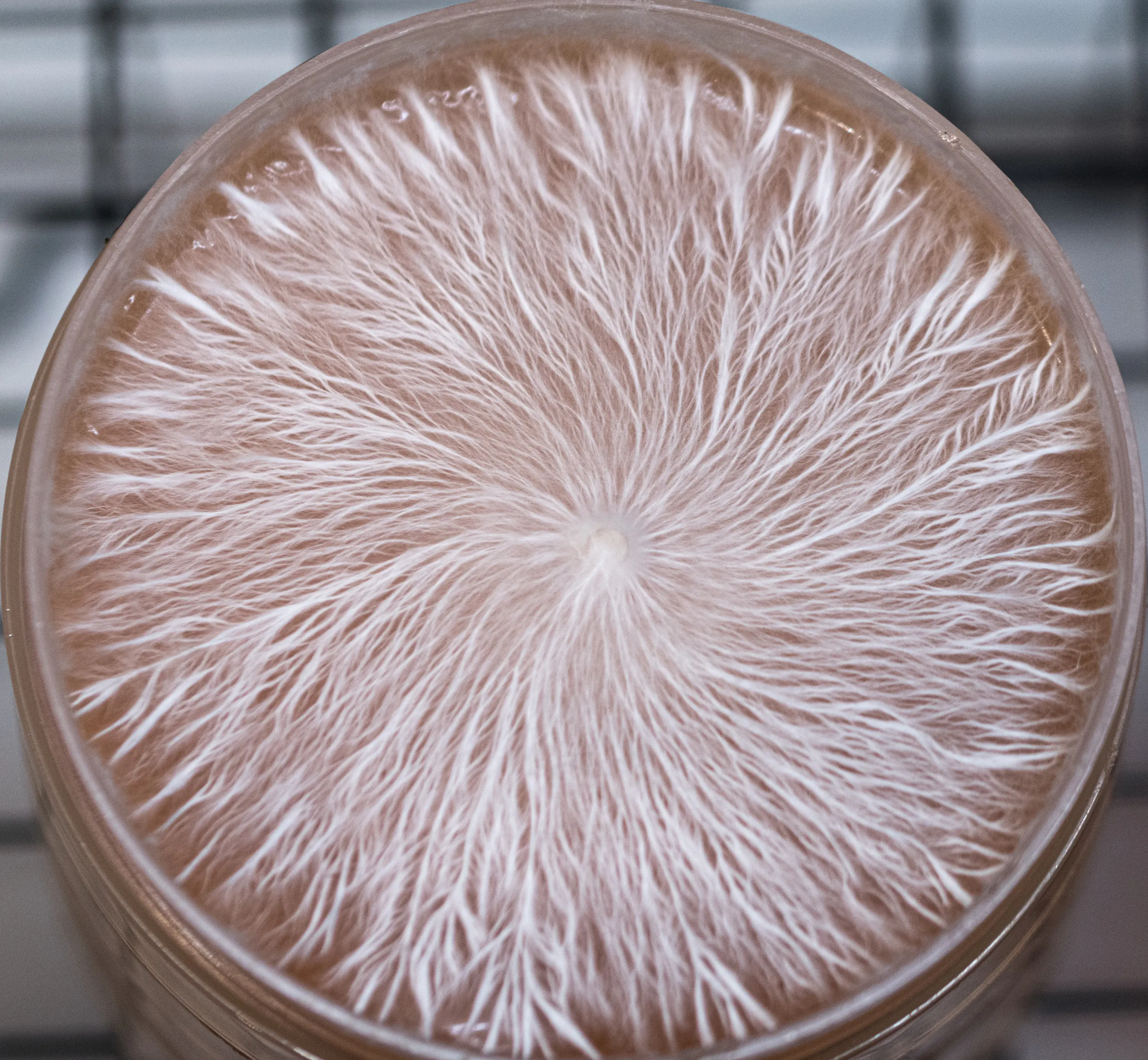
You're looking at premium mycelium cultivation on agar plates, where those white, flowing structures contain the powerful erinacine compounds that make Erinamax so effective for cognitive enhancement.
NGF & BDNF Modulation: The Foundation of Lion's Mane's Effects
The power behind Lion's Mane's brain-boosting potential lies in its ability to stimulate the production of nerve growth factor (NGF) and brain-derived neurotrophic factor (BDNF). These are the two most well-known neurotrophins, which are specialized proteins that may support neuron growth, maintenance, survival, and overall function.
Research has identified two distinct families of bioactive compounds responsible for this remarkable activity:
-
Erinacines: Powerful Nerve Growth Factor Stimulators in Mycelium
Erinacines from mycelium are the more potent NGF stimulators. Found primarily in the mushroom's mycelium (root-like structures), these cyathane diterpenoids have demonstrated powerful neurotrophic effects in multiple studies. Erinacine A, the most well-studied compound, has shown the ability to cross the blood-brain barrier and significantly increase NGF production.[1]
In cell studies, aqueous extracts containing erinacines induced NGF synthesis and promoted neurite outgrowth in neuroblastoma-glioma cells, with effects that were enhanced when combined with exogenous NGF.[1]
-
Hericenones: NGF Supporters from Fruiting Bodies
Hericenones from fruiting bodies also support NGF production, though with less robust activity compared to erinacines. These compounds, including hericenones C, D, E, and H, are primarily found in the mushroom's fruiting body and have been shown to stimulate NGF synthesis in nerve cells.[2]
Establishing the NGF Mechanism (Mori 2008)
The foundational understanding of Lion's Mane's NGF-inducing activity was established by Mori et al. in 2008, who conducted the first comprehensive study in human astrocytoma cells.[3] Among four edible mushrooms tested (Lion's Mane, Eringi, Maitake, and Himematsutake), only Lion's Mane extract promoted NGF mRNA expression in a concentration-dependent manner. The study revealed that Lion's Mane enhances both NGF gene expression and protein secretion, with conditioned medium from treated cells significantly enhancing neurite outgrowth in PC12 neurons.
This study provided mechanistic insights, giving the first clear understanding of how Lion's Mane compounds translate into measurable effects. The study also demonstrated in vivo efficacy,[3] showing that mice fed a diet containing 5% Lion's Mane dry powder for 7 days exhibited increased NGF mRNA expression in the hippocampus, confirming that the mushroom's bioactive compounds can cross the blood-brain barrier and enhance NGF production in living animals.
Brain-Derived Neurotrophic Factor (BDNF) Enhancement
Beyond NGF, more recent research has revealed that Lion's Mane compounds can also modulate brain-derived neurotrophic factor (BDNF), another crucial protein for brain health. A groundbreaking 2018 study found that erinacine A upregulates BDNF, providing mood-boosting effects in animal models.[4] This dual action on both NGF and BDNF suggests that Lion's Mane compounds may target upstream regulatory mechanisms common to both neurotrophins.[2]
The significance of NGF and BDNF modulation cannot be overstated. These neurotrophic factors are essential for neuroplasticity, which is the brain's ability to form new neural connections, reorganize existing pathways, and adapt to new experiences. By supporting both NGF and BDNF production, Lion's Mane creates an optimal environment for neurogenesis (the formation of new neurons), synaptogenesis (the creation of new synaptic connections), and overall brain plasticity.
Neurite Outgrowth and Synaptogenesis: Building Better Brain Networks
One of the most visually compelling effects of Lion's Mane extracts is their ability to stimulate neurite outgrowth, or the extension of projections from nerve cell bodies that form the basis of neural networks. In laboratory studies, cells treated with Lion's Mane extracts showed dramatic increases in the formation of dendrites and axons, the cellular structures that allow neurons to communicate with each other.[1]
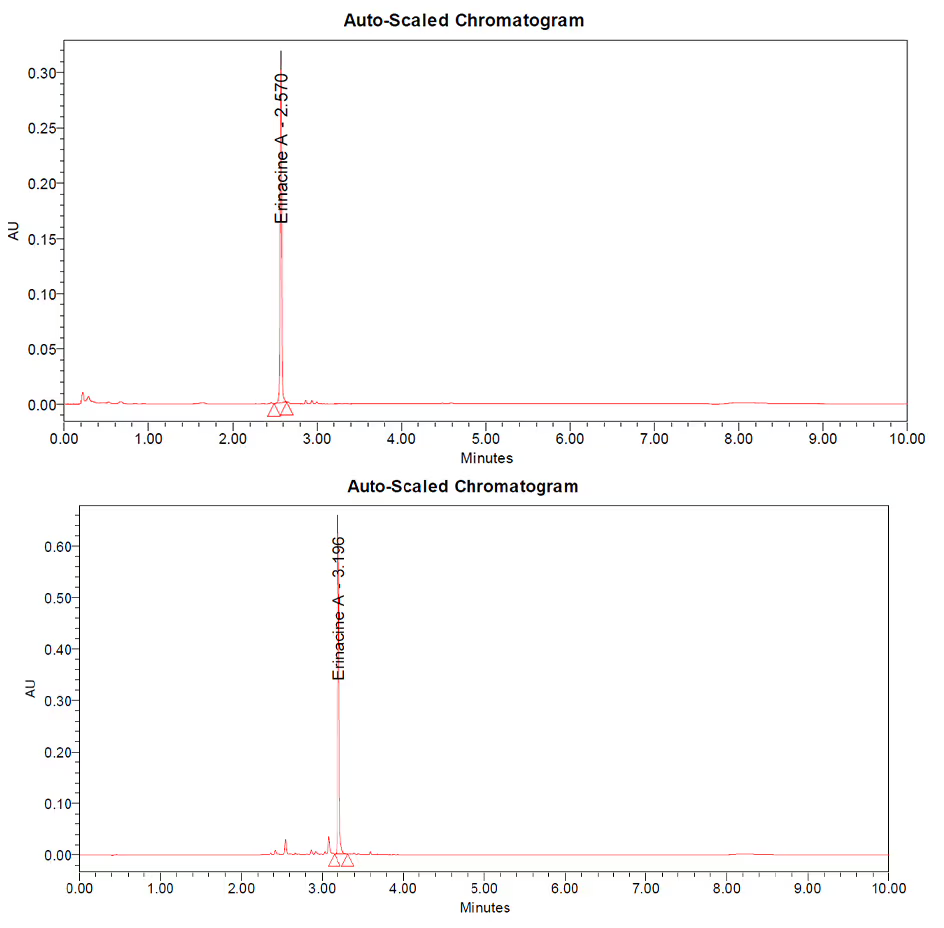
These chromatography results demonstrate verified erinacine A content in Erinamax compared to reference standards, giving you confidence that you're getting genuine bioactive compounds.
This neurite-promoting activity works synergistically with NGF. When Lion's Mane extract was combined with low concentrations of NGF, the result was a 60.6% increase in neurite outgrowth compared to NGF alone, demonstrating that the mushroom's bioactive compounds don't just mimic NGF, but actually enhance its natural effects.[1] This suggests that Lion's Mane supplementation could amplify the brain's natural capacity for neural repair and growth.
The formation of new neural connections through synaptogenesis is fundamental to learning, memory consolidation, and cognitive flexibility. By promoting the growth of dendritic spines and supporting the formation of new synaptic connections, Lion's Mane may help maintain cognitive function as we age and could even support recovery from neural injury.
Additional Mechanisms: Beyond Neurotrophin Support
While NGF and BDNF modulation remain Lion's Mane's primary claims to fame, the mushroom supports brain health through several additional pathways that work together to create comprehensive neuroprotection:
- Antioxidant Protection is a crucial but often overlooked aspect of Lion's Mane's benefits. The brain is highly susceptible to oxidative stress due to its high oxygen consumption and lipid-rich environment. Studies have shown that Lion's Mane extracts provide significant antioxidant activity,[5] helping to neutralize free radicals that can damage neurons and contribute to cognitive decline. This antioxidant protection works synergistically with neurotrophin support to maintain optimal brain function.
- Inflammatory Response Modulation adds another layer of neuroprotection. Chronic neuroinflammation is increasingly recognized as a key factor in cognitive decline and neurodegenerative conditions. Lion's Mane has demonstrated the ability to support healthy inflammatory responses in neural tissue, potentially reducing the production of inflammatory cytokines that can interfere with normal brain function.[4]
- Gut-Brain Axis Support is an emerging area of Lion's Mane research. The mushroom has shown potential benefits for digestive health, and growing evidence suggests that a healthy gut microbiome is essential for optimal brain function.[6-8] While research is still in early stages, some studies indicate that Lion's Mane may influence gut microbiota composition, potentially supporting cognitive health through this bidirectional communication pathway between the digestive system and the brain.[5]
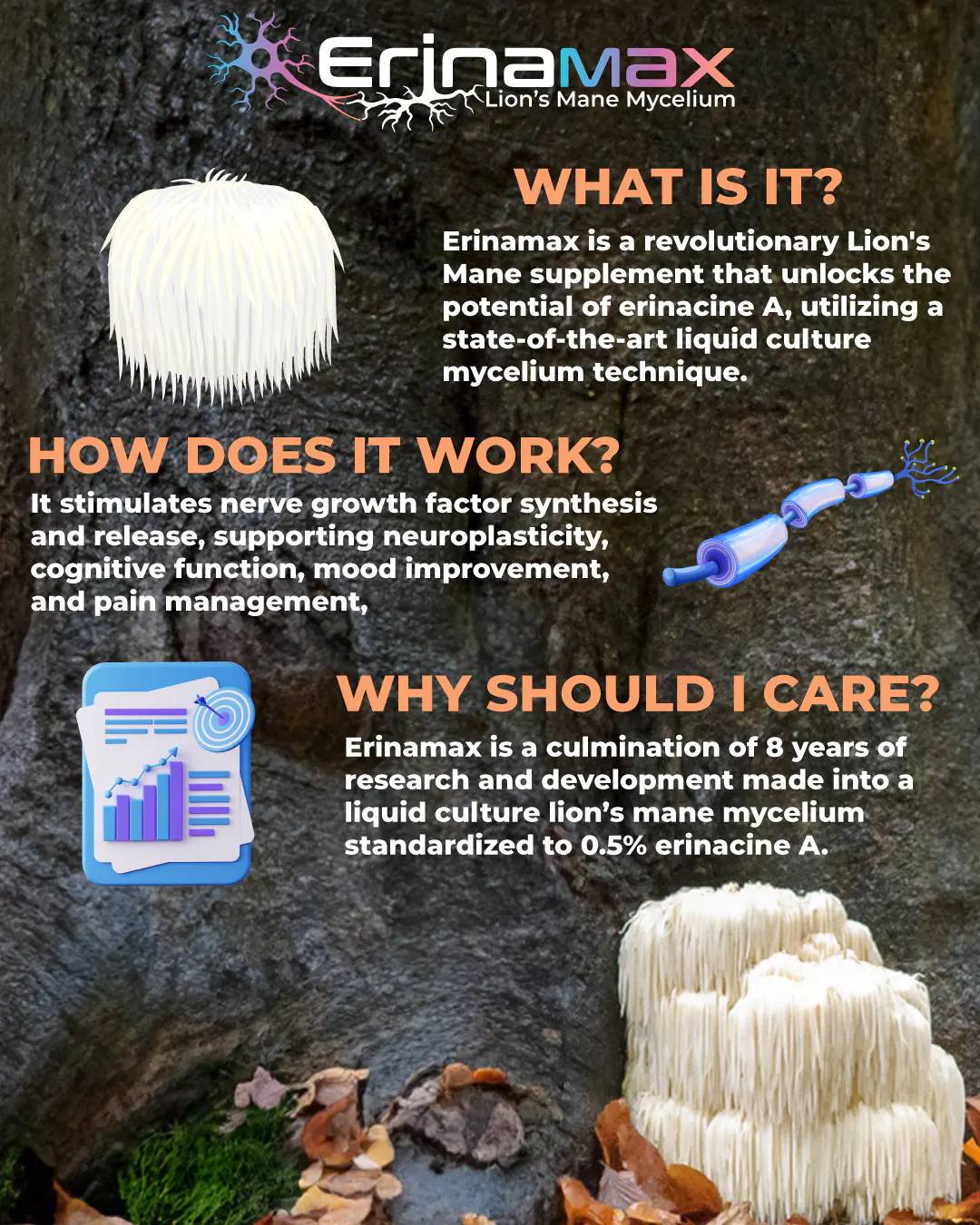
This breakthrough supplement harnesses liquid culture technology to deliver verified erinacine A content, giving you real NGF stimulation for enhanced brain function and neuroplasticity support.
Together, these multiple mechanisms create what researchers call a "pan-neurotrophic pathway" -- a comprehensive approach to brain health that addresses neuroplasticity, protection, and repair simultaneously. This multi-target approach may explain why users often report not just improved focus and memory, but also better mood, reduced brain fog, and enhanced overall cognitive resilience with Lion's Mane.
Yet, as we'll discuss in the coming sections, the quality and composition of Lion's Mane supplements greatly matter. To achieve the full spectrum of benefits, extracts must contain meaningful levels of both hericenones and erinacines, along with supporting compounds like beta-glucans. This is where understanding the differences between fruiting body and mycelium extracts becomes crucial for choosing the right supplement for your specific cognitive goals.
But before getting into specific extracts and standardizations, it's first important to go through the human clinical evidence:
Clinical Evidence and Human Trials
While the mechanistic research on Lion's Mane is promising, the real test lies in human clinical studies. Fortunately, the evidence from controlled trials continues to build a strong case for Lion's Mane's cognitive and mood-supporting benefits.
Cognitive Function
The most robust evidence for Lion's Mane's cognitive benefits comes from several well-designed human trials spanning different populations and age groups:
-
Mori et al. (2009) - Mild Cognitive Impairment in Elderly Adults
This randomized, double-blind, placebo-controlled trial followed 30 participants (aged 50-80) with mild cognitive impairment for 16 weeks.[9] Participants received 250mg tablets containing 96% Lion's Mane dry powder three times daily, delivering a total daily dose of 750mg.
The results were striking: Lion's Mane significantly improved cognitive scores on the Hasegawa Dementia Scale compared to placebo, with benefits appearing after 8 weeks and continuing to improve through week 16. The study also revealed a crucial insight, however: Cognitive benefits diminished during the 4-week follow-up period after supplementation ceased, suggesting that continued use may be necessary to maintain effects.[9]
-
Saitsu et al. (2019) - Cognitive Enhancement in Healthy Japanese Adults
This 12-week randomized controlled trial investigated 800mg daily of Lion's Mane fruiting bodies in healthy Japanese adults over age 50.[10] The study showed significant improvements in recognition functions measured by the Mini-Mental State Examination, indicating that Lion's Mane can enhance cognitive performance even in individuals without existing impairment.
This research demonstrated that Lion's Mane benefits extend beyond cognitive decline prevention to active enhancement in healthy adults.
-
Docherty et al. (2023) - Acute and Chronic Effects in Healthy Young Adults
This pioneering study examined both acute (single-dose) and chronic (28-day) effects of 1.8g daily Lion's Mane using sophisticated cognitive testing in healthy young adults aged 18-45.[11] Results showed significant acute improvements in the Stroop task at 60 minutes post-dose, indicating enhanced attention and working memory.
The study also found a trend toward reduced subjective stress following 28 days of supplementation, suggesting that there may be mood benefits alongside cognitive enhancement.
This research brought Lion's Mane research into the modern era with comprehensive cognitive testing in a younger demographic.
-
Vigna et al. (2019) - Overweight Adults with Lifestyle Intervention
The 8-week study used 3.6g daily of a Lion's Mane extract (80% mycelia, 20% fruiting body) alongside a low-calorie diet in 77 overweight and obese adults.[12] Beyond significant improvements in mood and sleep quality, the study revealed increased circulating pro-BDNF levels without changes in mature BDNF, providing biological evidence for Lion's Mane's neurotrophin-modulating effects in humans.
This research provided unique insights by combining Lion's Mane with lifestyle intervention in a metabolically compromised population.
Mood and Neuropsychiatric Effects
Lion's Mane's benefits extend well beyond cognitive enhancement into mood regulation support, with clinical evidence supporting its traditional use for emotional well-being:
-
Nagano et al. (2010) - Mood and Anxiety in Menopausal Women
Effects of Hericium erinaceus on exhaustive swimming times. Values are expressed as the means ± SD. *P<0.05, compared with the C group. C, control; LHT, low-dose HEP-treated group; MHT, moderate-dose HEP-treated group; HHT, high-dose HEP-treated group.[13]
This randomized, double-blind, placebo-controlled trial studied 30 menopausal women who consumed cookies containing 500mg of Lion's Mane fruiting body powder four times daily (2g total) for 4 weeks.[5] Using validated scales including the Center for Epidemiologic Studies Depression Scale and Indefinite Complaints Index, researchers found significant reductions in anxiety, frustration, feelings of sadness, and palpitation symptoms compared to placebo. The study also showed improvements in concentration and reduced irritability, suggesting broad mood-stabilizing effects.
This research provided the foundational clinical evidence for Lion's Mane's mood-regulating properties.
-
Chiu et al. (2018) - Mechanistic Study of Antidepressant Effects
Using a chronic restraint stress model in mice, this study demonstrated that erinacine A-enriched Lion's Mane extract produced significant mood-boosting effects through modulation of the BDNF/PI3K/Akt/GSK-3β signaling pathway.[4] The research showed that Lion's Mane not only increased BDNF levels but also reduced pro-inflammatory cytokines (IL-6, TNF-α) and increased monoamine neurotransmitters (serotonin, dopamine, norepinephrine).
This animal research revealed the mechanistic basis for the mood benefits observed in human studies, providing a comprehensive neurobiological explanation for Lion's Mane's potential mood-supporting properties in healthy individuals.
-
Vigna et al. (2019) - Mood Benefits in Overweight Adults
The Vigna et al. (2019) study discussed above provided additional human evidence for well-being benefits, showing significant improvements in mood and anxiety scores in overweight adults.[12] The study used standardized mood assessment tools including Zung's Depression and Anxiety Self-Assessment Scales, demonstrating that Lion's Mane's mood benefits aren't limited to menopausal symptoms but extend to broader populations with mood disturbances.
While more human research is always needed, the consistency of mood benefits across different populations and study designs suggests great anxiolytic and mood-stabilizing effects from Lion's Mane.
Neuroprotective Effects
Beyond cognitive enhancement in healthy populations, Lion's Mane has demonstrated potential neuroprotective effects in experimental laboratory models, providing promising preclinical research for understanding its mechanisms of action. These laboratory findings may help explain how Lion's Mane supports normal brain function in healthy individuals.
Amyloid-β Protection and Memory Preservation
The most compelling preclinical evidence comes from Mori et al. (2011), who investigated Lion's Mane's protective effects against amyloid β(25-35) peptide-induced learning and memory deficits in mice.[15] This study is significant because amyloid-β peptides are central to severe neurodegenerative conditions, and the Aβ(25-35) fragment specifically has been shown to have potent amnesic effects while retaining the neurotoxic properties of full-length amyloid peptides.
The experimental design involved injection of aggregated Aβ(25-35) peptide on days 7 and 14, with mice receiving either a control diet or a diet containing 5% Lion's Mane fruiting body powder throughout the 23-day study period. Cognitive function was assessed using two validated behavioral tests: the Y-maze test for spatial short-term memory and the novel-object recognition test for visual recognition memory.
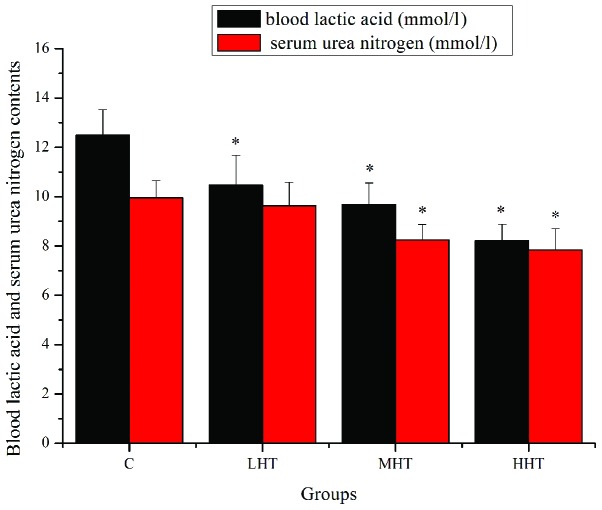
Effects of Hericium erinaceus on blood lactic acid and serum urea nitrogen content. Values are expressed as the means ± SD. *P<0.05, compared with the C group. C, control; LHT, low-dose HEP-treated group; MHT, moderate-dose HEP-treated group; HHT, high-dose HEP-treated group.[13]
The results were incredible: Lion's Mane completely prevented the impairments in both spatial short-term memory and visual recognition memory that were induced by amyloid-β administration.[15] Mice receiving the control diet showed significant cognitive deficits following Aβ(25-35) injection, with alternation behavior in the Y-maze dropping from approximately 65% to 55%. However, mice fed the Lion's Mane-supplemented diet maintained normal cognitive performance despite amyloid-β challenge, with alternation behavior remaining at healthy control levels around 62%.
This neuroprotective effect extended to visual recognition memory, where Lion's Mane prevented the decline in discrimination ratio that occurred in amyloid-treated control mice.
This study provides critical evidence that Lion's Mane's NGF-stimulating properties could translate into meaningful neuroprotection against pathological processes associated with neurodegenerative conditions. The research demonstrates the possibility that consistent supplementation may support the maintenance of cognitive function even in the presence of significant neurochemical insult.
Key Human Trials Summary
| Year | Study Population | Dose/Duration | Primary Outcomes | Reference |
| 2009 | 30 adults with MCI (50-80y) | 750mg/day, 16 weeks | Improved cognitive scores; effects diminished after cessation | Mori et al. |
| 2010 | 30 menopausal women | 2g/day, 4 weeks | Improved mood, reduced anxiety and palpitation symptoms | Nagano et al. |
| 2019 | 77 overweight/obese adults | 3.6g/day, 8 weeks | Improved mood, sleep, increased pro-BDNF levels | Vigna et al. |
| 2019 | Healthy adults >50y | 800mg/day, 12 weeks | Enhanced recognition memory and cognitive function | Saitsu et al. |
| 2023 | 41 healthy adults (18-45y) | 1.8g/day, 28 days | Acute cognitive improvements, reduced stress trends | Docherty et al. |
The clinical evidence demonstrates that Lion's Mane produces measurable cognitive and mood benefits across diverse populations, from healthy young adults seeking cognitive enhancement to older adults with mild cognitive impairment. The consistency of results across different study designs, populations, and outcome measures provides strong support for Lion's Mane as an evidence-based nootropic and mood-supporting supplement.
Importantly, the human studies reveal optimal dosing patterns (typically 750mg to 3.6g daily), time courses for effects (benefits typically emerge within 4-8 weeks), and the importance of continued supplementation for sustained benefits. These clinical insights, combined with the mechanistic understanding from cellular and animal studies, position Lion's Mane as the most scientifically validated functional mushroom for cognitive and neuropsychiatric support.
Lion's Mane Extracts: Fruiting Body vs. Mycelium
Understanding the differences between Lion's Mane fruiting body and mycelium extracts is crucial for selecting the right supplement for your specific health goals. Until now, this has been one of the most confusing aspects of functional mushroom supplementation.
-
Hericenones Concentrated in Fruiting Bodies
Hericenones are a family of cyathane diterpenoids primarily concentrated in Lion's Mane fruiting bodies (the visible, above-ground mushroom structure that most people recognize). Research has identified multiple hericenones (C, D, E, F, G, and H) that demonstrate NGF-stimulating activity.[5] These compounds are predominantly alcohol-soluble, meaning they require ethanol-based extraction methods to achieve optimal concentration.
Advanced fermentation technology like this allows for consistent, high-quality erinacine A production at commercial scale, ensuring you get the same potent results in every batch.
Extraction Considerations
The alcohol-soluble nature of hericenones has important implications for supplement quality. Studies have shown that neuroprotective compounds in Lion's Mane "are of lower polarity and can be mainly extracted with organic solvents", while these beneficial compounds are "most likely absent in the aqueous preparation" using water-only extraction.[1] This explains why many water-extracted Lion's Mane products may fail to deliver the cognitive benefits associated with hericenone compounds!
-
Erinacines Exclusively Found in Mycelium
Erinacines are the most potent NGF-stimulating compounds in Lion's Mane, but they're found exclusively in the mycelium -- the underground root-like network that most consumers never see. Among the erinacines (A, B, C, D, E, F, G, H, I, J, K, and S), erinacine A has received the most research attention due to its superior ability to cross the blood-brain barrier and stimulate NGF production.[2]
The Cultivation Challenge
Most commercial mycelium products face a significant quality problem: they're grown on grain substrates (rice, oats, etc.) that become impossible to separate from the actual mycelium. This results in products that are more grain than mushroom, dramatically diluting the concentration of beneficial erinacines. Laboratory analysis has shown that many products claiming high erinacine content actually contain little to none of these valuable compounds.
-
Beta-Glucans Found in Both Sources
The Erinamax project required solving countless technical challenges, from developing reference standards to perfecting cultivation methods -- complexity that ultimately benefits your brain health.
Beta-glucans are structural polysaccharides that provide immune-supporting and general wellness benefits. These water-soluble compounds are found in both fruiting bodies and mycelium, though fruiting bodies typically contain higher concentrations. Research indicates that full-spectrum fruiting body extracts can contain 25% or more beta-glucans, while concentrated extracts may contain 15% minimum.[1]
Bioavailability Enhancement
Beta-glucans are naturally trapped within the mushroom's cell walls (chitin), making them poorly bioavailable in raw mushroom form. Hot water extraction breaks down these cell walls, liberating the polysaccharides and significantly improving their absorption and biological activity.
-
Hot Water Extraction for Full Spectrum 1:1 Extracts
Hot water extraction has been used for centuries in Traditional Chinese practice and creates what's known as a 1:1 extract -- one kilogram of raw mushroom yields one kilogram of dried extract after water removal. This method effectively breaks down chitin cell walls and extracts water-soluble compounds including beta-glucans, polysaccharides, and some water-soluble organic compounds.[1]
Limitations of Water-Only Extraction
The reality check you need -- most mushroom companies claiming high erinacine levels can't back up their promises with real testing, leaving you with expensive rice powder instead of active compounds.
While hot water extraction captures the full spectrum of water-soluble compounds, it misses many of the alcohol-soluble bioactives that contribute to Lion's Mane's cognitive benefits. Research has consistently shown that water-only preparations lack the neuroprotective compounds found in alcohol-based extracts, which may explain why some users experience limited cognitive benefits from 1:1 water extracts.
-
Dual Solvent Extraction for 8:1 Concentrated Extracts
Dual solvent extraction uses both water and ethanol to capture both water-soluble and alcohol-soluble compounds, creating more concentrated extracts. An 8:1 extract means eight kilograms of raw mushroom are used to produce one kilogram of concentrated extract -- not necessarily making it eight times more potent, but significantly shifting the compound profile toward the alcohol-soluble bioactives.
Targeted Compound Concentration
This extraction method preferentially concentrates hericenones and other ethanol-soluble compounds while still retaining meaningful levels of beta-glucans and water-soluble components. The studies cited in this article suggest that these alcohol-soluble compounds are responsible for cognitive and cardiovascular benefits, making dual solvent extracts ideal for users seeking specific cognitive enhancement rather than general wellness support.
-
Liquid Culture Fermentation for High-Yield Erinacine Production
Liquid culture fermentation is the cutting edge of Lion's Mane cultivation technology. Instead of growing mycelium on grain substrates, this method uses nutrient-rich liquid media in controlled bioreactors. Research has shown that optimized liquid culture conditions can produce mycelium with erinacine A concentrations exceeding 0.5% -- levels virtually impossible to achieve through traditional cultivation methods.[2]
Quality Control and Standardization
Liquid culture fermentation allows for precise control over growing conditions, resulting in consistent erinacine production batch after batch. This method also eliminates the grain contamination problem that plagues traditional mycelium products, ensuring that what you're getting is pure mushroom mycelium rather than a mixture of mushroom and grain particles. Advanced analytical testing can verify erinacine A content using HPLC, TLC, and NMR spectroscopy to ensure product potency and purity.
The choice between fruiting body and mycelium extracts ultimately depends on your specific health goals. Fruiting body extracts excel at providing hericenones for cognitive support and beta-glucans for immune function, while properly cultivated mycelium extracts offer unique access to powerful erinacines for targeted NGF stimulation. Understanding these distinctions empowers consumers to select products that align with their individual wellness objectives rather than falling victim to marketing claims that obscure these important differences.
This all leads us into what Nootropics Depot has been pioneering in the recent years:
Nootropics Depot's Erinacine A Breakthrough: The Erinamax Story
For years, the supplement industry has been plagued by Lion's Mane products making bold erinacine claims without any way to verify their content. With the grain substrate problem identified, it became clear that it's nearly impossible to separate the actual mycelium from rice or other fillers. Even more problematic, no standardized testing methods existed for erinacine A, the most studied and promising compound in Lion's Mane mycelium!
This led to Nootropics Depot's groundbreaking effort to develop the first verified reference standard for erinacine A.
Once they developed a verified standard for erinicine A, they discovered something even more concerning: widespread low standards in analytical testing standardization! Many companies were claiming erinacine content of 4% or higher with no legitimate way to verify these claims.
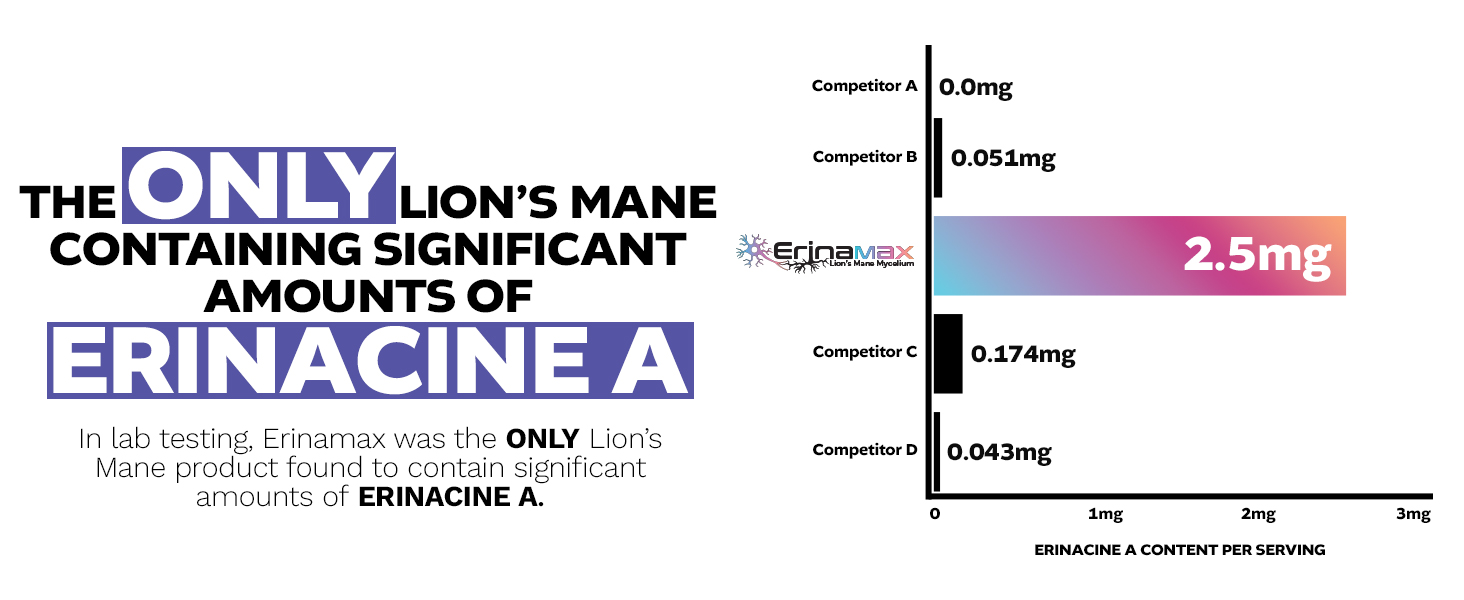
When independent labs tested competing Lion's Mane products, the results were shocking - most contained virtually zero erinacine A while Erinamax delivered a full 2.5mg per serving.
The situation became clear when Nootropics Depot sent a completely fabricated "Lion's Mane mycelium" sample to a suspected fraudulent laboratory (their sample made from functional yeast extract spiked with abietic acid (a compound structurally similar to erinacines). The fake lab returned results claiming the sample contained exactly 4% erinacines, confirming the rampant testing fraud plaguing the industry.

This is where the magic happens - controlled fermentation systems that produce erinacine A-rich mycelium, moving beyond basic beta-glucans to deliver the neuroregenrative compounds your brain actually craves.
-
Developing a Reference Standard
It wasn't an easy feat, though: Nootropics Depot spent nearly a decade solving the complex technical challenges involved in creating an erinacine A reference standard. The first major hurdle was obtaining sufficient raw material -- none of the commercially available Lion's Mane mycelium products contained meaningful amounts of erinacines despite their label claims. This forced the team to expand their laboratory capabilities and bring in specialized analytical chemistry expertise.
Advanced Analytical Methods
The breakthrough came through sophisticated analytical chemistry techniques. Using UPLC (Ultra Performance Liquid Chromatography), TLC (Thin Layer Chromatography), and NMR (Nuclear Magnetic Resonance) spectroscopy, the team successfully isolated and purified milligrams of pure erinacine A. This painstaking process required processing massive quantities of raw material to obtain even small amounts of the reference compound, but it enabled the creation of the industry's first legitimate erinacine A analytical standard.
Exposing Industry Fraud
Armed with their reference standard, Nootropics Depot tested numerous commercial Lion's Mane mycelium products claiming high erinacine content. The results were shockingly disappointing: products claiming 4% erinacines often contained little to none of these valuable compounds. This confirmed what many suspected -- that many erinacine claims were borderline-fraudulent, with poorly-done laboratory reports that didn't reflect high-quality analytical testing.
-
Liquid Culture Fermentation Success
Creating the reference standard was only half the battle. Nootropics Depot still needed a reliable source of high-erinacine mycelium. Traditional grain-based cultivation simply couldn't produce meaningful erinacine levels, so they had to find partners specializing in advanced liquid culture fermentation using controlled bioreactors.
Breakthrough Batch Results by Partnering with Cultivation Experts
The partnership paid off dramatically. The first successful batch of liquid culture mycelium tested at an impressive 0.85% erinacine A -- levels virtually impossible to achieve through traditional cultivation methods. This represented a quantum leap in Lion's Mane mycelium quality, providing the raw material needed to create a standardized commercial product.
Here's the proof that matters -- independent lab verification showing 2.6mg of erinacine A per capsule, confirming you're getting genuine bioactive compounds instead of empty promises.
They named it Erinamax.
Commercial Scale Production
Scaling from laboratory quantities to commercial production required massive bioreactors capable of producing hundreds of kilograms of pure mycelium biomass. The precision fermentation process allows for consistent erinacine A production batch after batch, with each lot rigorously tested to meet the 0.5% minimum standard that defines Erinamax.
-
Real Erinacine Content Equals Measurable Benefits
For the first time in the supplement industry, consumers can access Lion's Mane mycelium with verified, meaningful erinacine A content. This isn't just a marketing claim, it's backed by reference standards and sophisticated analytical testing so that each batch delivers genuine NGF-stimulating compounds.
The Beginning, Not the End
The erinacine A breakthrough is just the start of a larger innovation program. The same analytical chemistry expertise that created the erinacine A reference standard is now being applied to develop reference standards for hericenones and other bioactive compounds. This approach will eventually enable the creation of truly full-spectrum Lion's Mane products with verified content of all major bioactive compounds.
Through eight years of dedicated research and development, Nootropics Depot has solved one of the functional mushroom industry's most persistent quality problems. Erinamax stands as proof that with sufficient scientific rigor and investment in proper analytical methods, it's possible to create supplements that actually deliver on their promises rather than just their marketing claims.
However, there's more than just Erinamax -- Nootropics Depot offers a few different lab-tested options for consumers.
Nootropics Depot Lion's Mane Product Comparison
Nootropics Depot currently has three distinct Lion's Mane products, each designed to target specific aspects of the mushroom's complex benefits profile. Understanding the differences between these offerings allows you to select the option that best aligns with your individual health goals and desired outcomes.
ND Lion's Mane 8:1 Dual Extract (Fruiting Body)
The 8:1 Lion's Mane extract utilizes the advanced dual solvent extraction technology described above, combining both water and ethanol to capture the full spectrum of bioactive compounds. This approach shifts the compound profile toward ethanol-soluble bioactives while maintaining meaningful water-soluble components.
Hericenone-Rich Profile for Cognitive Enhancement
This extract excels at delivering hericenones, the alcohol-soluble compounds that help give Lion's Mane's cognitive benefits. With a minimum 15% beta-glucan content alongside concentrated hericenones, the 8:1 extract provides targeted support for cognitive function, mood enhancement, and focus improvement. Users often report sharper mental clarity, enhanced memory, and smoother overall cognitive performance, making this extract ideal for those seeking specific nootropic benefits.
Nootropics Depot Lion's Mane Mushroom 8:1 Extract – Deals and Price Drop Alerts
Get Price Alerts
No spam, no scams.
Disclosure: PricePlow relies on pricing from stores with which we have a business relationship. We work hard to keep pricing current, but you may find a better offer.
Posts are sponsored in part by the retailers and/or brands listed on this page.
ND Lion's Mane 1:1 Full Spectrum Extract (Fruiting Body)
The 1:1 full spectrum extract employs traditional hot water extraction methods that have been used for centuries in heritage cultures. This approach breaks down the mushroom's tough chitin cell walls, liberating trapped polysaccharides and creating a comprehensive extract that contains every beneficial compound present in the original fruiting body.
Maximum Beta-Glucan Content
With a minimum 25% beta-glucan content, the 1:1 extract provides the highest concentration of these immune-supporting polysaccharides among Nootropics Depot's Lion's Mane offerings. Beta-glucans are structural polysaccharides that support immune system function, promote relaxation, and contribute to overall wellness, making this extract ideal for those seeking broad-spectrum health benefits.
Comprehensive Wellness Support
The full spectrum nature of this extract makes it perfect for daily wellness routines. Users often find it supports not only cognitive function but also immune health, stress management, and general well-being. The 1:1 extract provides a gentler, more holistic approach to Lion's Mane supplementation compared to the targeted cognitive focus of the 8:1 extract.
Nootropics Depot Lion's Mane Mushroom 1:1 Extract – Deals and Price Drop Alerts
Get Price Alerts
No spam, no scams.
Disclosure: PricePlow relies on pricing from stores with which we have a business relationship. We work hard to keep pricing current, but you may find a better offer.
Posts are sponsored in part by the retailers and/or brands listed on this page.
Erinamax (Mycelium)
Described in detail above, Erinamax is the biggest breakthrough in Lion's Mane supplementation in a decade, utilizing cutting-edge liquid culture fermentation in controlled bioreactors rather than traditional grain-based cultivation. This advanced methodology produces pure mycelium with unprecedented erinacine A concentrations.
Verified Erinacine A Standardization
Each batch of Erinamax is standardized to contain a minimum 0.5% erinacine A, with the first commercial batch testing at an impressive 0.85%. Every batch undergoes rigorous UPLC, TLC, and NMR testing to ensure consistent potency and purity.
Targeted NGF and Neuroplasticity Support
Erinamax delivers the most potent NGF-stimulating compounds available in Lion's Mane, specifically targeting neuroplasticity, neurogenesis, and long-term brain health. Users often report more acute and noticeable effects compared to fruiting body extracts, with benefits becoming apparent within 30 minutes of consumption. The high erinacine A content makes Erinamax ideal for those seeking maximum neurotrophin support and cognitive enhancement.
Advanced Pain Management Properties
Beyond cognitive benefits, Erinamax offers unique pain management effects, particularly for nerve-related discomfort. The NGF-stimulating properties support nerve regeneration and repair, while erinacine E's mild kappa opioid receptor activity provides additional pain relief. This combination creates a distinctive approach to nerve health that sets Erinamax apart from other Lion's Mane products.
Nootropics Depot ErinaMax – Deals and Price Drop Alerts
Get Price Alerts
No spam, no scams.
Disclosure: PricePlow relies on pricing from stores with which we have a business relationship. We work hard to keep pricing current, but you may find a better offer.
Posts are sponsored in part by the retailers and/or brands listed on this page.
Product Comparison Table
| Product | Source | Extraction Method | Key Compounds | Primary Benefits |
| 8:1 Dual Extract | Fruiting Body | Dual Solvent (Water + Ethanol) | Hericenones, 15% Beta-glucans | Cognitive function, mood, cardiovascular health |
| 1:1 Full Spectrum | Fruiting Body | Hot Water | High beta-glucans (25%), full spectrum | Immune support, general wellness, relaxation |
| Erinamax | Liquid Culture Mycelium | Standardized extraction | 0.5% Erinacine A minimum | NGF support, neuroplasticity, nerve health |
Who Should Take What?
- Choose the 8:1 dual extract if you're primarily interested in cognitive enhancement, improved focus, and mental clarity.
- Select the 1:1 full spectrum extract if you want comprehensive wellness support rather than targeted cognitive enhancement.
- Opt for Erinamax if you're seeking maximum neurotrophin support, have specific neuroplasticity goals, or are interested in nerve health applications.
Additional Notes: Usage, Stacking, and Safety
Understanding proper dosing protocols, strategic supplement combinations, and safety considerations helps maximize Lion's Mane's benefits. Based on clinical research and user experiences, here's what you need to know for optimal results:
Dosing Guidelines
Nootropics Depot recommends 500mg per capsule as the standard serving size across their Lion's Mane product line. This dosing aligns well with clinical research, which has shown efficacy at doses ranging from 250mg to 3g daily depending on the specific extract and intended benefits.[5]
-
Frequency and Timing Considerations
Take Lion's Mane 1-2 times daily, with timing flexibility based on your specific product choice. For Erinamax, empty stomach consumption is preferred to enhance absorption of erinacine compounds, while the 8:1 and 1:1 fruiting body extracts can be taken with or without food. Many users find morning consumption ideal for cognitive benefits, though evening doses may support relaxation and recovery.
-
Timeline for Full Effects
Expect 3-4 weeks of consistent supplementation before experiencing the full range of Lion's Mane's benefits. While some users report acute effects (especially with Erinamax) within 30 minutes, the neuroplastic changes that support long-term cognitive enhancement require sustained use. Clinical studies have demonstrated continued improvement in cognitive scores through 16 weeks of supplementation, with benefits diminishing when supplementation is discontinued.[9]
Stacking Options
Your stack will depend on your goals. A few are shown below:
-
Cognitive Enhancement Stacks
For users seeking maximum nootropic benefits, Lion's Mane pairs exceptionally well with cholinergic compounds. Combining Lion's Mane 8:1 or Erinamax with Alpha-GPC (300-600mg) or CDP-Choline / Citicoline (250-500mg) creates synergistic effects on memory formation and mental clarity. The NGF-stimulating effects of Lion's Mane enhance cholinergic neuron health, while choline compounds provide the raw materials for neurotransmitter synthesis.
Consider Two Lion's Mane Supplements at Once!
The most advanced cognitive stack combines Erinamax with Lion's Mane 8:1, providing both NGF synthesis support from erinacines and NGF sensitization from hericenones. This creates what Nootropics Depot calls "a very full spectrum NGF focused Lion's Mane stack" that leverages complementary mechanisms for maximum neurotrophin support.
-
Stress Management and Mood Support
Lion's Mane's mood-regulating properties work synergistically with adaptogenic herbs. Pairing any Lion's Mane extract with ashwagandha (300-600mg) creates a solid stress support platform. Lion's Mane addresses the neurochemical aspects through BDNF modulation, while ashwagandha manages cortisol response and stress adaptation. This combination has shown benefits for both cognitive performance under stress and overall mood stability.
Alternatively, some enjoy bacopa monnieri more, and there are a few excellent Nootropics Depot bacopa supplements as well.
-
Memory and Longevity Applications
For users focused on memory enhancement and brain aging, combining Lion's Mane with phosphatidylserine (100-300mg) creates powerful synergies. Phosphatidylserine supports membrane health and cognitive function, while Lion's Mane promotes neuroplasticity and repair. This stack addresses both the structural and functional aspects of brain health, making it ideal for older adults or those concerned with cognitive longevity.
Safety & Side Effects
Lion's Mane has been generally well-tolerated in human clinical trials conducted to date, with most studies reporting no significant adverse effects.[11] Clinical research spanning 4-49 weeks of continuous use has consistently shown good tolerability across diverse populations, from healthy young adults to elderly individuals with mild cognitive impairment.
-
Mild Gastrointestinal Considerations
The most commonly reported side effects involve mild gastrointestinal discomfort in sensitive individuals. This typically manifests as slight stomach upset, nausea, or digestive changes during the first few days of supplementation. These effects usually resolve as the body adapts to the supplement and can often be minimized by taking Lion's Mane with food (except for Erinamax, which requires empty stomach consumption for optimal absorption).
-
Important Contraindications
Individuals with known mushroom allergies should avoid Lion's Mane products entirely, as cross-reactivity may occur. While Lion's Mane is generally safe, those with compromised immune systems or autoimmune conditions should consult healthcare providers before beginning supplementation, as the immune-modulating beta-glucans may interact with some protocols.
-
Drug Interactions and Special Populations
Pregnant or nursing women should avoid Lion's Mane supplementation due to insufficient safety data in these populations. Current research indicates minimal drug interaction potential, though the theoretical possibility exists for compounds affecting blood clotting or blood sugar regulation. As with any supplement regimen, individuals taking prescription medications or those with existing health conditions should consult with healthcare providers before beginning Lion's Mane supplementation.
The standardization and quality control implemented by reputable manufacturers like Nootropics Depot significantly reduces contamination risks that have historically been associated with mushroom supplements. Their analytical testing protocols ensure products are free from heavy metals, microbial contaminants, and other adulterants that could compromise safety.
The Lion's Mane Revolution: Your Brain's New Best Friend
Lion's Mane stands out as one of the most scientifically-validated functional mushrooms available today, with clinical evidence supporting its cognitive, mood, and neuroprotective benefits. From the pioneering Japanese research that first identified erinacine A's neurotrophic properties to the latest controlled human trials demonstrating measurable cognitive improvements, Lion's Mane has consistently proven its worth as a serious nootropic supplement.
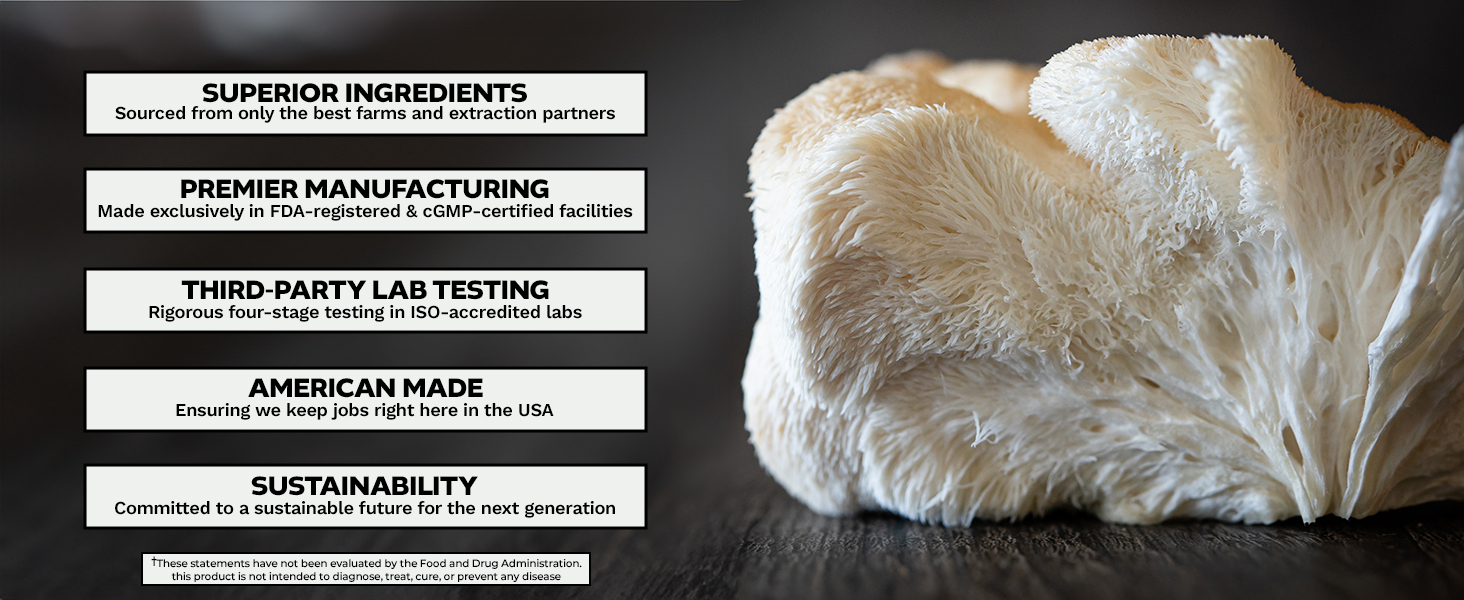
Nootropics Depot's commitment extends beyond the supplement itself -- from sustainable sourcing through FDA-registered manufacturing to independent lab verification, ensuring every batch meets their rigorous quality standards.
The development of Erinamax was a watershed moment in functional mushroom supplementation, and more people need to understand it. For the first time in the industry's history, consumers can access Lion's Mane mycelium with verified, meaningful erinacine A content, all backed by proprietary reference standards and sophisticated analytical testing that ensures genuine NGF-stimulating activity. This breakthrough sets a new standard for what's possible when scientific rigor meets innovative cultivation technology.
Just as they did with ecklonia cava and cistanche, finding ways to improve upon entire categories with better extracts has become Nootropics Depot's calling. Their commitment to transparency and innovation have fundamentally changed the Lion's Mane landscape.

Cistanche tubulosa, the "desert ginseng" that saved Genghis Khan's army, naturally supports testosterone through enhanced enzyme production. Modern research validates 2,000+ years of use for hormonal health, cognitive function & vitality.
The eight-year journey to develop the first legitimate erinacine A reference standard, expose industry-wide testing fraud, and partner with cutting-edge liquid culture specialists demonstrates what happens when a company prioritizes scientific integrity over marketing claims. The result is a product line that offers genuine choice based on real compound differences rather than empty promises.
Whether you choose the 1:1 full spectrum extract for comprehensive wellness support, the 8:1 dual extract for targeted cognitive enhancement, or Erinamax for maximum NGF stimulation, you're getting products backed by legitimate science and transparent manufacturing processes. The convergence of traditional wisdom with modern analytical chemistry has created opportunities for cognitive enhancement that were simply impossible just a few years ago.
As research continues to unveil Lion's Mane's full potential and manufacturing standards continue to evolve, one thing remains certain: the future of functional mushroom supplementation will be defined by companies willing to invest in real science rather than rely on marketing hype.
Stay ahead of the latest developments in Lion's Mane research and product innovations by following PricePlow's Nootropics Depot news and alerts:
Nootropics Depot ErinaMax – Deals and Price Drop Alerts
Get Price Alerts
No spam, no scams.
Disclosure: PricePlow relies on pricing from stores with which we have a business relationship. We work hard to keep pricing current, but you may find a better offer.
Posts are sponsored in part by the retailers and/or brands listed on this page.


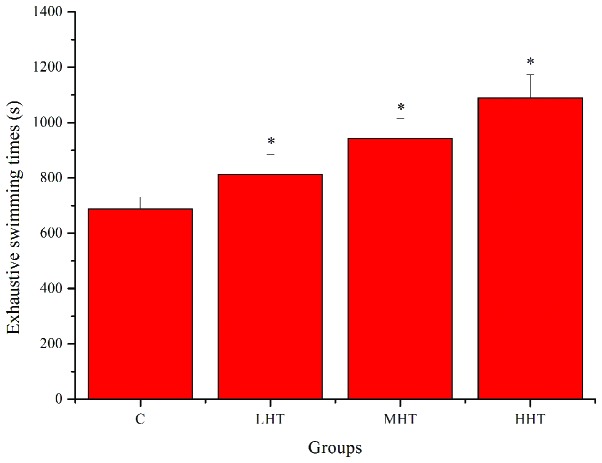
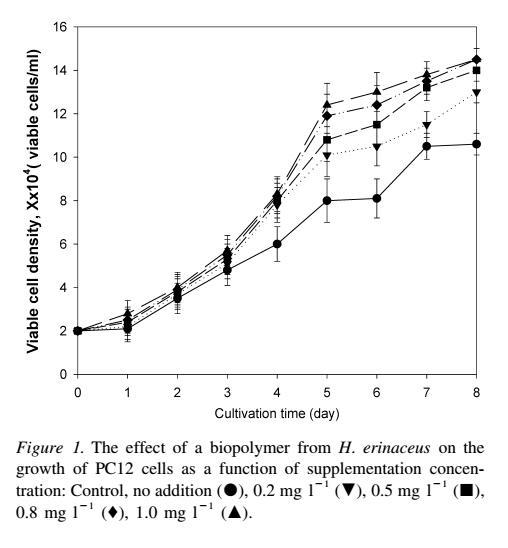



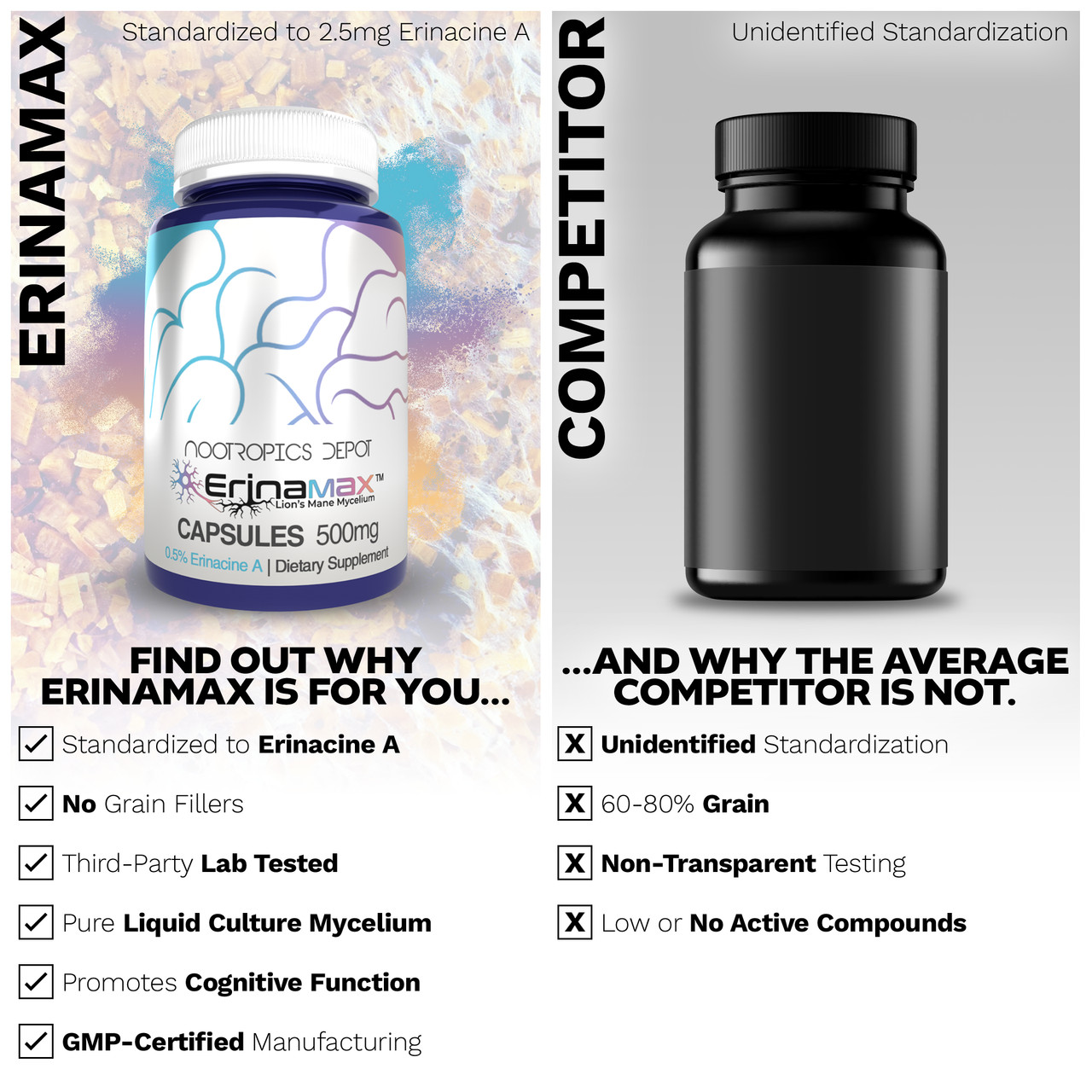
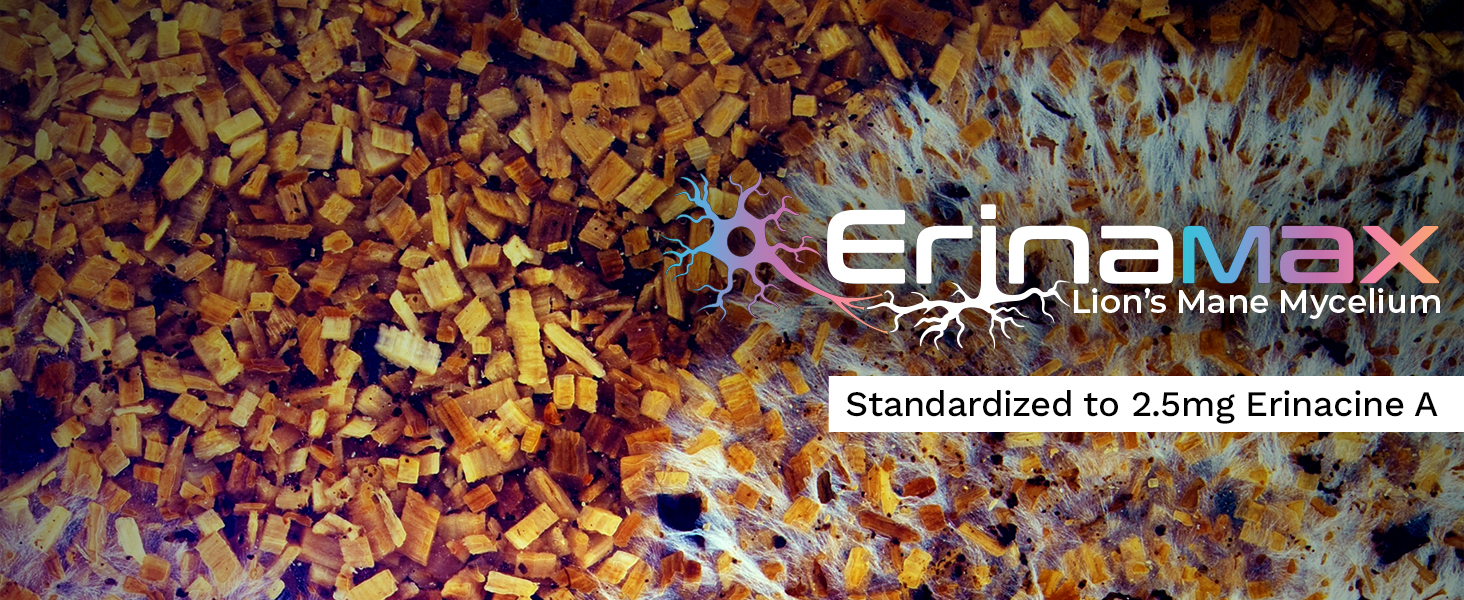
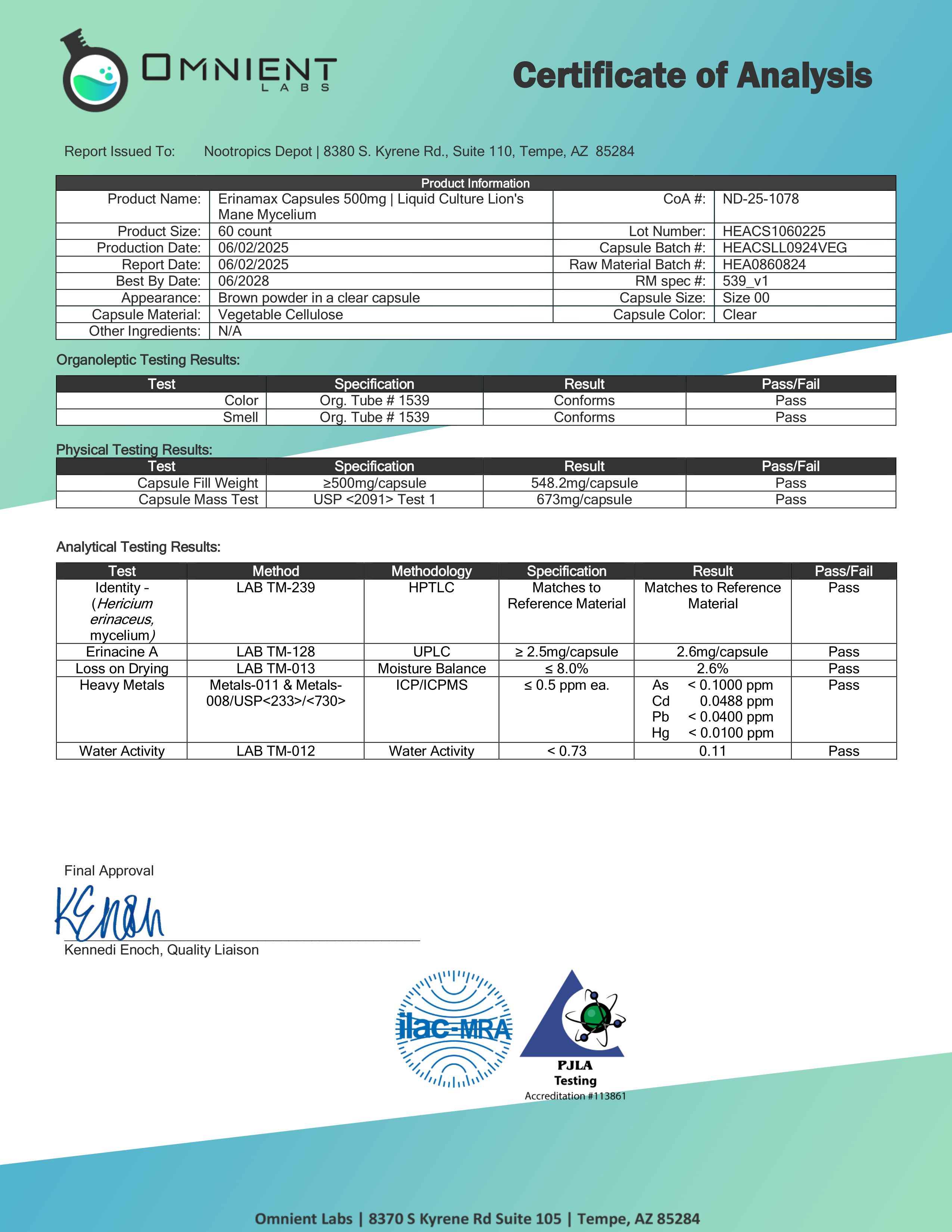
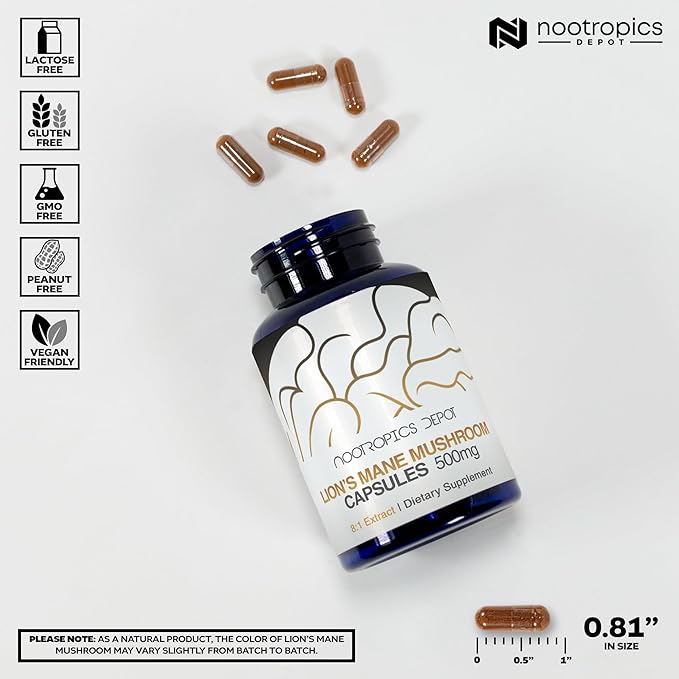
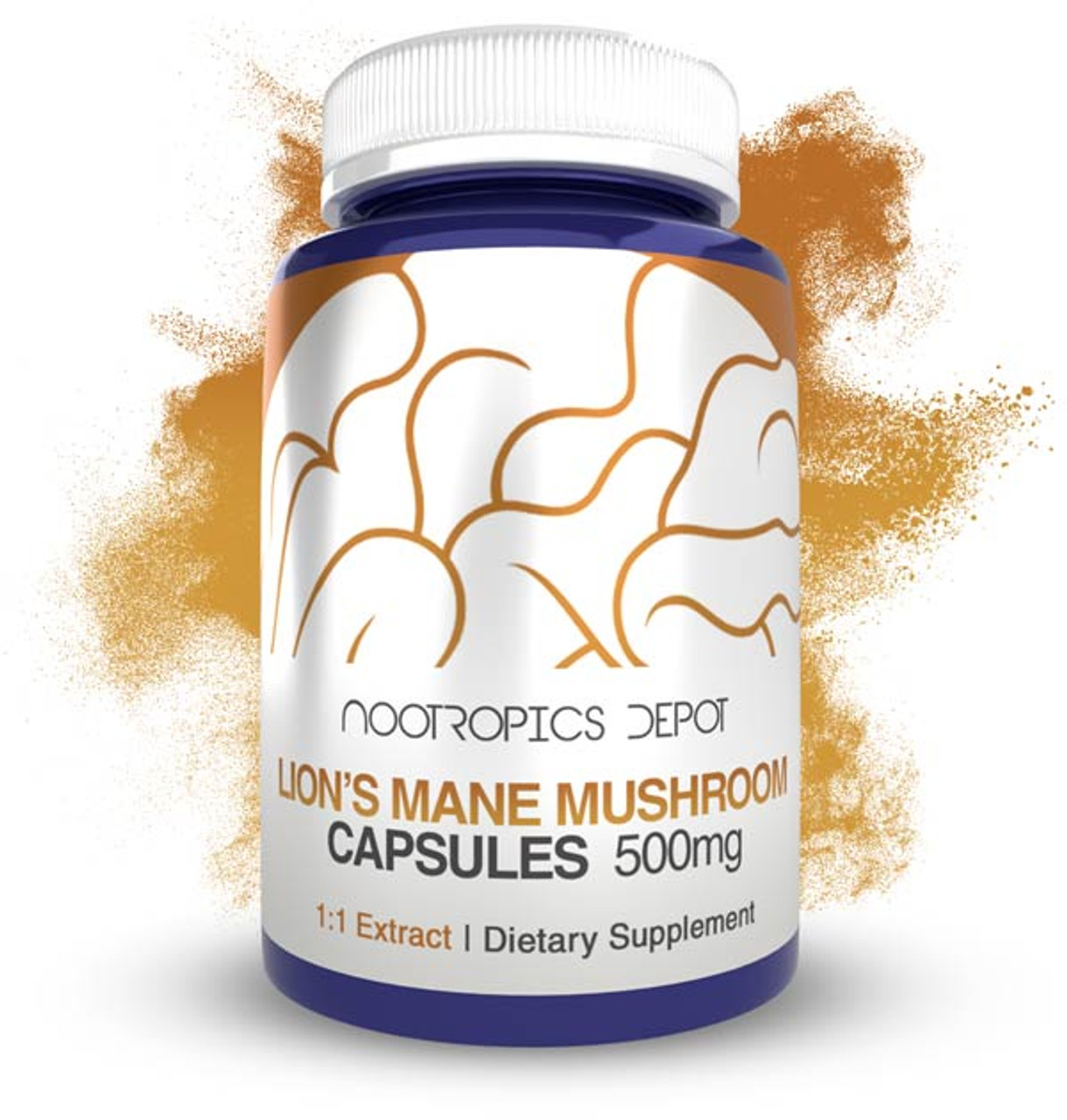
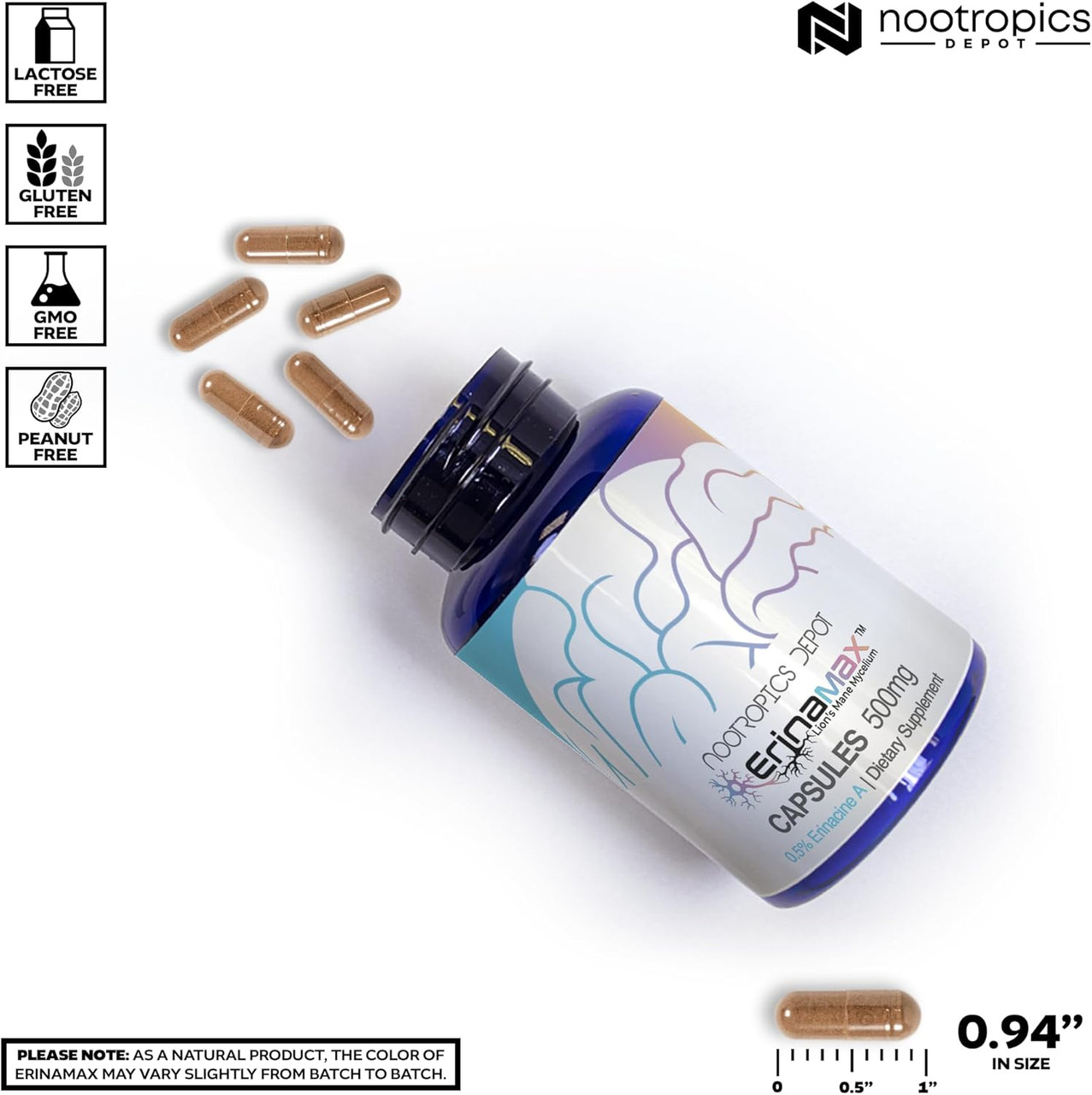
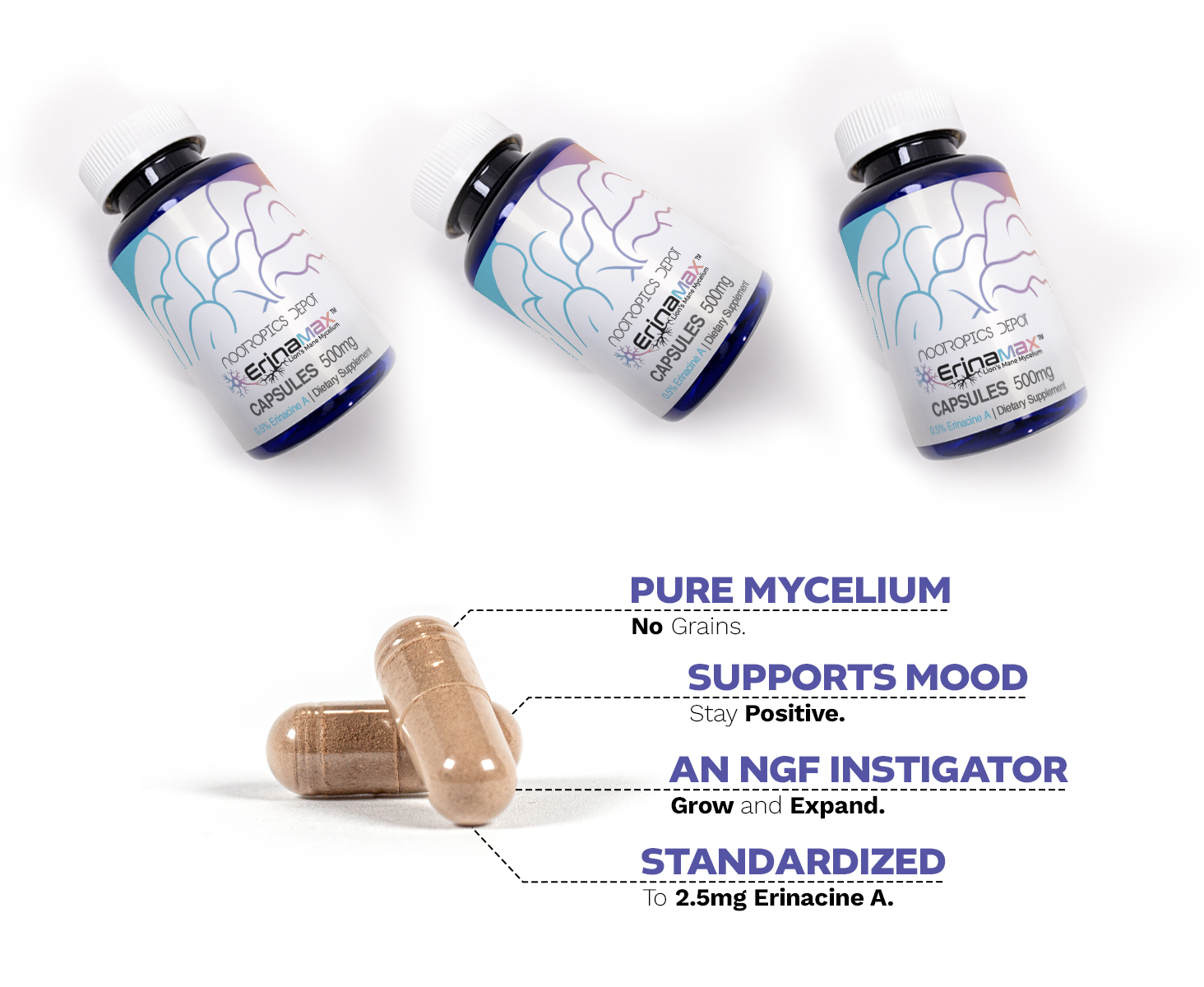
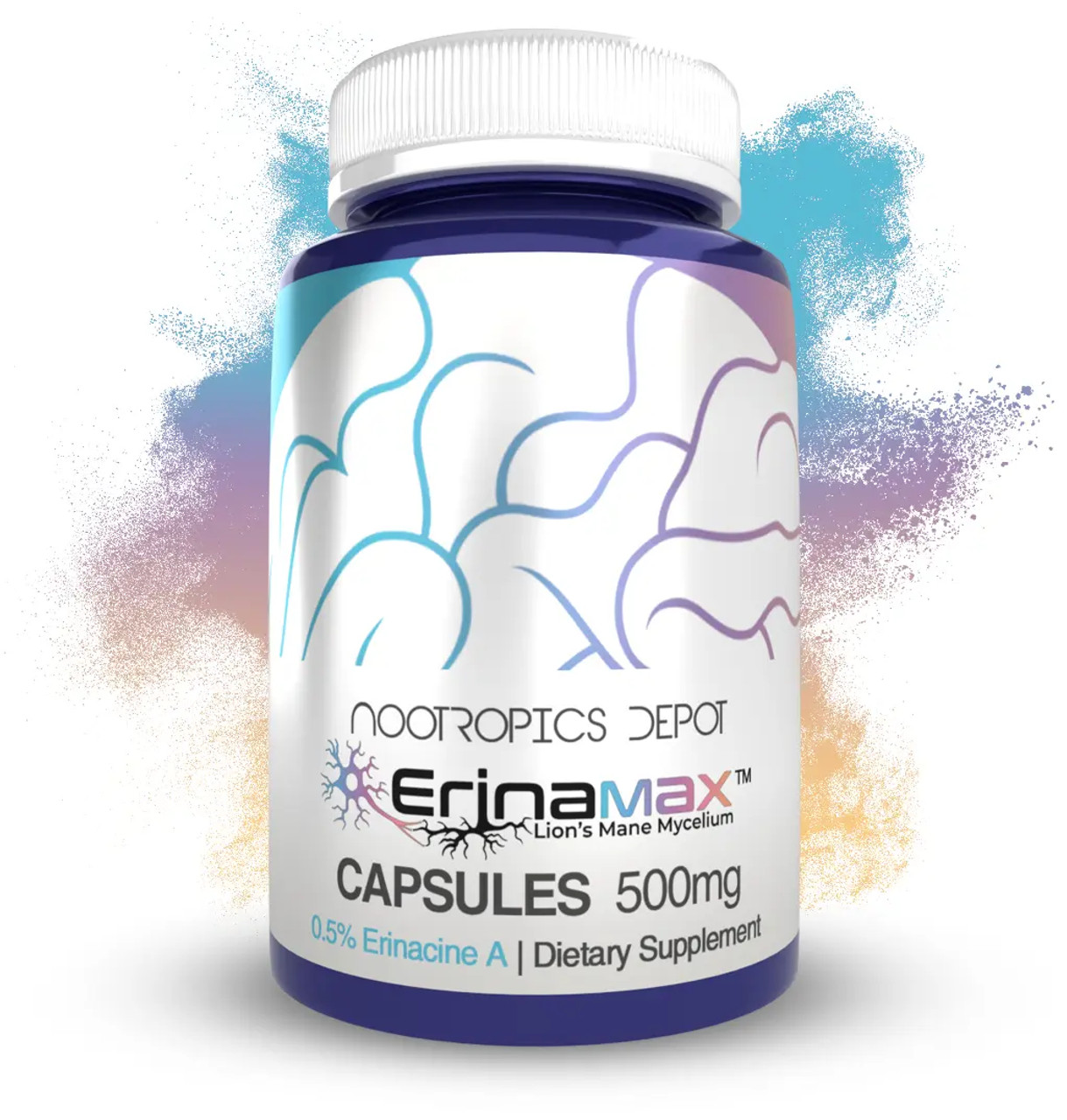



Comments and Discussion (Powered by the PricePlow Forum)